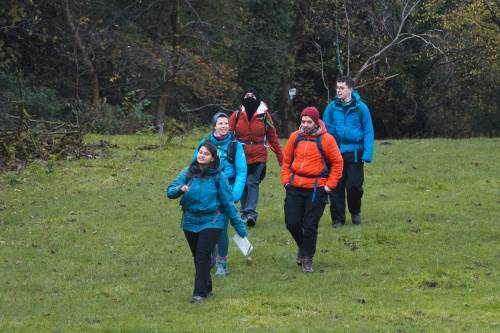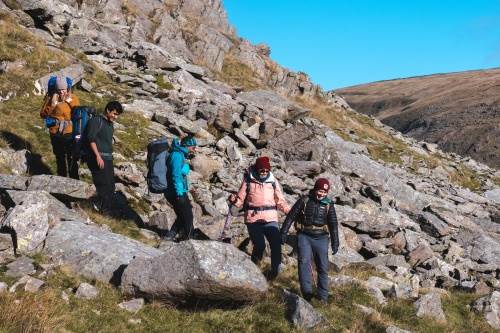Am I fit enough?

This is a question many people ask themselves ahead of a training or assessment course, particularly in relation to our walking qualifications, so we've written some guidance to help you assess your own fitness and understand what's required of a leader.
Mountain Training promotes a rounded approach to fitness as a leader that includes both physical and mental resilience. In this regard, the focus for candidates should be on completing Quality Days in relevant terrain:
The definitions of Quality Days (use the links above) for each qualification ensure that candidates experience varied weather and underfoot conditions, and cover different types of terrain e.g. fields, forest tracks and coastal paths for Lowland Leader, bogs and broken rocky ground for Mountain Leader, etc. The planning, execution and evaluation of these Quality Days provides opportunities to develop the necessary
physical fitness,
resilience and
decision-making skills.
 Candidates need to demonstrate that they can lead a quality day with the physical and mental fitness required to deal with an emergency or other unforeseen situation
Candidates need to demonstrate that they can lead a quality day with the physical and mental fitness required to deal with an emergency or other unforeseen situation, on top of the demands of the day. This requires stamina to lead others through the range of conditions that can be experienced and sufficient pace and agility to provide safety for their group. Candidates will be assessed against these criteria and not against each other.
There is no required minimum walking speed during training or assessment for any of the qualifications, though there is a timed navigation test as part of International Mountain Leader summer training - full details are in the
International Mountain Leader candidate handbook.
Here are some key factors to consider regarding fitness for a Mountain Training walking scheme course:
Endurance
Walking activities often involve sustained physical effort over extended periods. Building cardiovascular endurance through activities like walking, running, cycling, or swimming can be beneficial.
Strength and muscular endurance
Developing overall body strength, particularly in the legs, core, and upper body, is important for navigating steep and/or challenging terrain. Incorporating strength training exercises, such as bodyweight exercises, weightlifting or resistance training, can help improve muscular endurance.
Balance and coordination
Maintaining good balance and coordination is crucial for traversing uneven surfaces and negotiating obstacles. Activities like yoga, Pilates, or specific balance training exercises can help improve these skills.
Mobility
Improving your mobility allows for greater control which reduces the risk of injury. Incorporating functional mobility exercises and activities like yoga or Pilates into your routine can help improve the way you move.
Mental resilience
Outdoor environments can present unpredictable and challenging situations. Developing mental resilience, including the ability to stay focused, make sound decisions, and manage stress, is important for safe and enjoyable outdoor experiences.
Ultimately, the most specific approach is to gradually build your fitness level over time through regular walking activity relevant to the scheme you plan to undertake. If your time in accessing these environments is limited, then choose exercise activities that simulate the demands of outdoor environments. This allows you to develop the necessary physical and mental capabilities to make the most of your Mountain Training course.